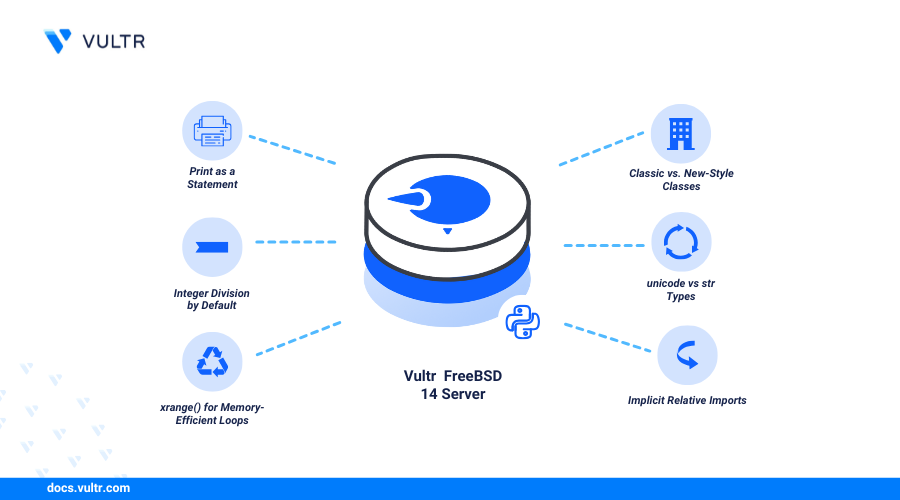
Python 2 reached end-of-life in 2020 but remains necessary for running legacy applications. Many older scripts, tools, and frameworks still depend on it, so you may need to install Python 2 on FreeBSD. FreeBSD 14 comes with Python 3 by default, so manual installation is required to enable Python 2 support.
This article explains how to install Python 2 on FreeBSD 14.
Prerequisites
Before you begin:
- Have access to a FreeBSD 14 instance as a non-root sudo user.
Compile and Install Python 2 on FreeBSD 14
Follow the steps below to compile and install Python 2 from the source code.
Verify the default Python version.
console$ python --version
Output.
Python 3.11.11The above output confirms that Python 3 is the system's default Python binary.
Python 2 is no longer in FreeBSD's package repositories. Download the Python 2.7 source from the Python releases page.
console$ wget https://www.python.org/ftp/python/2.7.18/Python-2.7.18.tgz
Extract all files from the downloaded tarball.
console$ tar -xvzf Python-2.7.18.tgz
Navigate to the extracted directory.
console$ cd Python-2.7.18
Run the configuration script with shared library support.
console$ ./configure --with-system-ffi --with-computed-gotos --enable-shared
Compile using all CPU cores for faster processing.
console$ make -j$(sysctl -n hw.ncpu)
Install Python 2 without overwriting the default Python binary.
console$ sudo make altinstall
Test the Python 2 Installation
Follow the steps below to test the Python 2 installation on your FreeBSD server.
Verify the installation.
console$ python2.7 --version
Output:
Python 2.7.18Check the default Python binary version.
console$ python --version
Output:
Python 3.11.11You can see that both versions are now available on your instance.
Create a symbolic link to allow the
python2command to run thepython2.7binary.console$ sudo ln -s /usr/local/bin/python2.7 /usr/local/bin/python2
Compile and Install PIP for Python 2
Pip is the standard Python package manager for managing Python packages and dependencies in your projects. Python 2 doesn't include Pip by default, so you'll install it manually.
Download the Pip installation script for Python 2.
console$ wget https://bootstrap.pypa.io/pip/2.7/get-pip.py
Install Pip for Python 2.7.
console$ sudo python2.7 get-pip.py
Verify the Pip installation.
console$ pip2.7 --version
Output.
pip 20.3.4 from /usr/local/lib/python2.7/site-packages/pip (python 2.7)
Test and Use Python 2
It's important to verify that everything works as expected after completing the installation. Follow the steps below to test your Python 2 installation.
Launch the Python 2 interpreter.
console$ python2Run the following command to display a
Hello World, Greetings from Vultr!message in your terminal.python>>> print('Hello World, Greetings from Vultr!')
Output.
Hello World, Greetings from Vultr!Exit from the Python shell.
python>>> quit()
To test Pip, install the Flask Python module using Pip.
console$ pip2.7 install flask
Output:
DEPRECATION: Python 2.7 reached the end of its life on January 1st, 2020. Please upgrade your Python version since Python 2.7 is no longer maintained. pip 21.0 will drop support for Python 2.7 in January 2021. More details about Python 2 support in pip can be found at https://pip.pypa.io/en/latest/development/release-process/#python-2-support pip 21.0 will remove support for this functionality. Name: Flask Version: 1.1.4 Summary: A simple framework for building complex web applications. Home-page: https://palletsprojects.com/p/flask/ Author: Armin Ronacher Author-email: armin.ronacher@active-4.com License: BSD-3-Clause Location: /home/jsah/.local/lib/python2.7/site-packages Requires: click, Jinja2, Werkzeug, itsdangerous Required-by:
Conclusion
You now have a fully functional Python 2.7 binary on your FreeBSD 14 instance that coexists with the system's default Python 3 binary. This setup allows you to run legacy applications while maintaining modern Python support. For additional guidance on working with legacy codebases, refer to the Python 2.7 documentation.